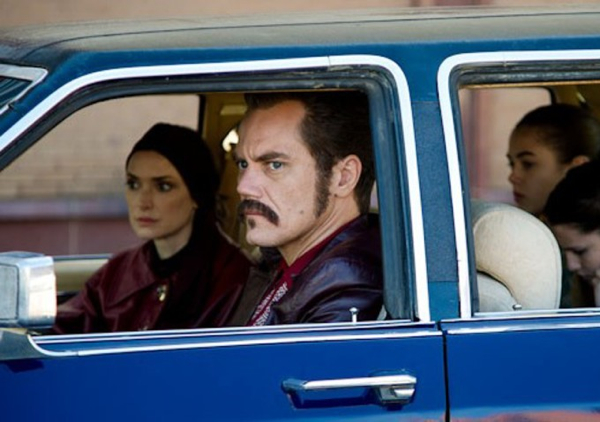Movie review by Greg Carlson
A grim, true crime account of the rise and fall of hitman Richard Kuklinski, a bearish mob affiliate and enforcer whose handiwork resulted in a body count estimated at more than 100 victims, Ariel Vromen’s “The Iceman” showcases another example of Michael Shannon’s totally committed, bravura acting chops. Despite a modest budget, the film effectively sketches the period detail of the gritty 1960s through 1980s East Coast environment (Detroit and Shreveport standing in for New York and New Jersey), evoking the street look of classic dramas photographed by Arthur Ornitz and Victor Kemper.
Based on the 1992 HBO documentary “The Iceman Tapes: Conversations with a Killer” and Anthony Bruno’s 1993 book “The Iceman: The True Story of a Cold-Blooded Killer,” Vromen’s film capitalizes on the unfathomable, unthinkable chasm that exists between Kuklinski the family man and Kuklinski the assassin. Keeping secrets and/or living a double life has served as the narrative engine of titles as wide-ranging as “Belle de Jour,” “Vera Drake,” “True Lies,” and “The Departed,” but “The Iceman” is perhaps closest to “The Sopranos” in terms of Kuklinski’s desire to offer a “normal” life to his wife and kids while concealing the volcanic reservoirs of lethal violence that guide his unorthodox vocation.
As Kuklinski’s wife, renamed Deborah for the movie, Winona Ryder has the unenviable task of playing a character unable to ask questions of or communicate fully with her spouse. The real Barbara Kuklinski described years of physical abuse at the hands of Richard, but Vromen elects to minimize the extent to which Kuklinski’s horrific behavior spilled over into his day-to-day domesticity. The fictionalized Kuklinski is dubiously constructed as a mostly loving husband determined to keep his demons hidden. As the façade begins to crumble, a scene of Richard’s physical abuse is placed as a marker of the man’s slide toward discovery and capture.
Along his twisted path, Kuklinski meets a curious doppelganger in Robert “Mr. Freezy” Pronge, a fellow contract killer whose incongruous front as an ice cream truck driver is just as implausible as Kuklinski’s own double life. Known in real life as Mister Softee and played by an unrecognizable Chris Evans, buried beneath sunglasses and facial hair, Pronge both escalates and diversifies the range of Kuklinski’s grisly trade, which soon includes the use of small spray bottles containing cyanide. Disguised on food or discreetly dispensed as a phony sneeze, the lethal poison is perhaps Kuklinski’s creepiest means of dispatching a target, although the postmortem dismemberments carried out by the two men are equally unsettling.
The presence of Ray Liotta as Gambino crime family crew leader Roy DeMeo links “The Iceman” to “Goodfellas” in spirit and partial milieu, but the tone of Vromen’s movie withholds any romanticizing of the “lifestyle” associated with the mob, instead considering Kuklinski as a perpetual outsider whose ability to commit murder stems in part from a brutal upbringing at the hands of physically and emotionally abusive parents. Using some of Kuklinski’s own confessional descriptions, Vromen alludes to some of the conditions that might shape a future killer, but “The Iceman” is ultimately not in a position to offer any definitive answers for Kuklinski’s psychopathy.
